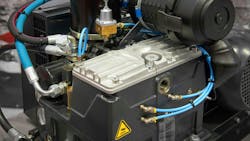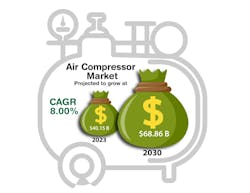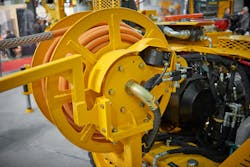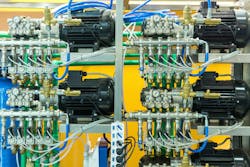Global Manufacturing Investments to Benefit Air Compressor Market
A new report from research firm 360iResearch is forecasting the global air compressor market will reach a value of $43.24 billion in 2024. The market is expected to achieve a compound annual growth rate (CAGR) of 8% over the coming years, and by 2030 is projected to be worth $68.86 billion.
Air compressors — devices which convert power into potential energy stored in the form of pressurized air — are a key element of pneumatic systems and are used in a range of industries.
Increasing industrialization around the world is helping drive market growth for air compressors which are used in manufacturing facilities. Their use in construction, power generation, oil & gas, automotive and other sectors are also aiding the market's future growth trajectory.
Industries and Regions Driving Air Compressor Market Growth
Demand for air compressors is on the rise in every global market, although the sectors driving it varies by region.
According to the 360iResearch report, growth for the air compressor market in the Americas is being driven by several industries including manufacturing, automotive and oil & gas. In South America specifically, the research firm said demand is surging because of the vast investments being made in industrialization and infrastructure as well as the region's growing automotive industry.
Some of this can be equated to the nearshoring and reshoring efforts taking place; many manufacturers are building new or expanding existing facilities in the Americas to improve their supply chains and more easily serve customers in those markets.
READ MORE: Manufacturers Invest in New and Updated Facilities to Meet Future Market Growth
The report noted the rapid industrial growth taking place in the Asia-Pacific region — particularly in China, Japan and India — is aiding the future growth trajectory of the air compressor market. Automotive production and investments in improving infrustructure in the region have an especially large impact on air compressor demand. 360iResearch said the manufacturing growth and infrastructure investments taking place in China and India in particular will provide opportunities for the market.
In the Middle East and Africa (MEA) region, several sectors are helping to drive continued demand for air compressors such as oil & gas, construction and mining.
360iResearch stated in its report there is a growing significance of 50-250 kW output power air compressors in the market. This is not surprising as they are commonly used in manufacturing facilities as well as construction and agricultural applications which are among the sectors said to be driving overall market growth.
Compressors in this power range are also known for their higher pressure capabilities, consistent output and longer run times which are desired traits by customers in many of the above mentioned regions and applications. As 360iResearch explained in its report, air compressors with this output power aids with operation of heavy machinery, pneumatic conveying systems and a number of other processes requiring constant and reliable airflow, which again meets the needs of the markets driving air compressor demand in the coming years.
Higher output air compressors are likely to benefit from these market drivers as well. Those in the 250-500 kW range, for instance, are suited to applications requiring high-volume compressed air delivery, said 360iResearch in its report, such as heavy manufacturing, mining and power generation. Compressors in this power range are robustly designed for use in harsh operating conditions.
There are also air compressors providing over 500 kW of power which are typically used in large industrial applications such as oil & gas exploration, metallurgy and large-scale energy projects said 360iResearch. Given the expected growth trajectory of these sectors, there will likely be market opportunities for the over 500 kW compressor range in the coming years.
Demand Increasing for Energy-Efficient Air Compressors
Interest is increasing in air compressors which can help lower energy use as various industries look to reduce operational costs as well as environmental impacts. Per 360iResearch's report, the oil & gas and manufacturing sectors in particular are helping drive this as well as global regulations.
The European Union as well as North and South American markets are those which are especially interested in utilizing energy-efficient air compressors. For Europe and North America, much of this demand is due to the need to follow stringent regulations.
While there is a desire for energy-efficient compressors, they are currently more expensive which can be an issue for cost-sensitive markets and a potential hinderance for growth of these compressor types.
READ MORE: Saving Energy in Compressed-Air Systems
Development of oil-free air compressors has increased to meet the global demand for energy-efficient options. These compressors use water or special coatings to lubricate internal components instead of oil. Although they can run hotter which can lead to some operational inefficiencies, there are also fewer internal components, requiring less maintenance and energy to operate.
Use of water as a lubricant in oil-free air compressors is seen as a way to overcome the potential inefficiencies associated with some designs. The water keeps components lubricated, and thus from running too hot and causing efficiency issues.
Lower maintenance and less energy intensive cooling requirements for oil-free air compressors enable the to provide a more energy-efficient solution as well.
Watch our video interview below with Robert Horneman, Product Manager at ELGi Industrial – a developer of air compressors – to learn more about the differences between oil-free and oil-lubricated air compressors.
Pharmaceutical Industry to Aid Uptake of Oil-Free Compressors
Besides the energy savings potential of oil-free air compressors, there are many safety benefits associated with them as well. In particular, they reduce the risk of oil getting into the air and possibly contaminating products.
This is an important factor for industries such as food & beverage and pharmaceuticals production where any type of contamination could cause critical safety issues. As such, use of oil-free air compressors are growing in these segments.
Read More Market Trends Data
For even more economic and market trends information for the fluid power and electric motion control industries, visit our State of the Industry page. There you'll find video interviews, articles and more overviewing current and future market information as well as insights on how these trends could impact hydraulic, pneumatic and electric component designs.
High-risk applications in which catastrophic effects could occur due to the presence of oil are those Robert Horneman, Product Manager at ELGi Industrial, said in an interview with Power & Motion best suited to use of oil-free air compressors. He noted that while oil-lubricated versions include filters and other accessories to help prevent oil from getting into the production environment, there is still a chance of it happening. And if those filters are not routinely maintained, the chances are even greater for oil to get into the air and cause issues.
Horneman said there is a growing trend toward use of oil-free air compressors in many markets. He sees growth of the pharmaceutical industry helping drive their increased use in the coming years.
The lack of oil in these compressors also benefits the environment as there is no chance of spills. There is also no need to determine how to safely dispose of oil after it is changed during maintenance of a compressor, which can add costs and downtime for an operation.
Therefore, environmental compliance can be assured which will help to propel market expansion for these compressors.
In another report from 360iResearch on the oil-free air compressor market, the firm is projecting a 5.57% CAGR over the next 6 years with this segment reaching a value of $15.88 billion by 2030.
About the Author
Sara Jensen
Executive Editor, Power & Motion
Sara Jensen is executive editor of Power & Motion, directing expanded coverage into the modern fluid power space, as well as mechatronic and smart technologies. She has over 15 years of publishing experience. Prior to Power & Motion she spent 11 years with a trade publication for engineers of heavy-duty equipment, the last 3 of which were as the editor and brand lead. Over the course of her time in the B2B industry, Sara has gained an extensive knowledge of various heavy-duty equipment industries — including construction, agriculture, mining and on-road trucks —along with the systems and market trends which impact them such as fluid power and electronic motion control technologies.
You can follow Sara and Power & Motion via the following social media handles:
X (formerly Twitter): @TechnlgyEditor and @PowerMotionTech
LinkedIn: @SaraJensen and @Power&Motion
Facebook: @PowerMotionTech

Leaders relevant to this article:




